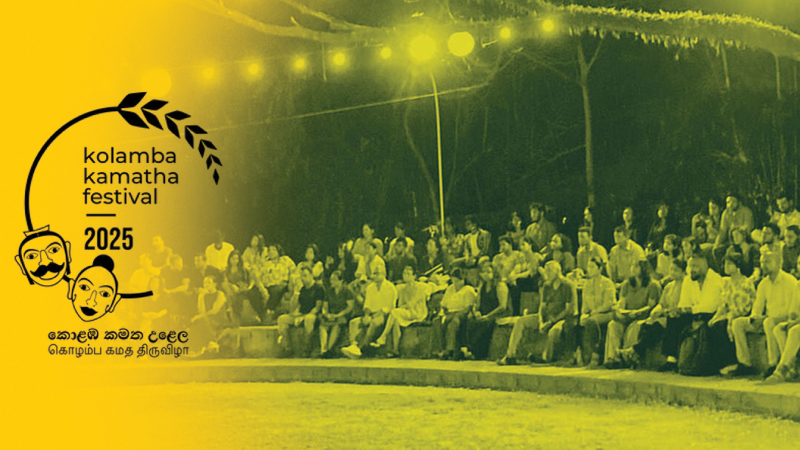 The Kolamba Kamatha Festival 2025 is a lively celebration of the performing arts that will be held from March 27 to 30 at ‘Kolamba Kamatha,’ a one-of-a-kind venue designed to enhance theatre culture in urban Colombo. This space was created to give artistes a place to shine without breaking the bank. It’s the brainchild of former President Chandrika Bandaranaike Kumarathunga, who has always been a big supporter of the Arts. In conversation with the Observer Muse, Bimsara Premachandra, curator of the Kolamba Kamatha Festival 2025, shared the exciting plans for this year’s Festival, which will feature a variety of performances, workshops and hands-on activities for everyone to enjoy.
The Kolamba Kamatha Festival 2025 is a lively celebration of the performing arts that will be held from March 27 to 30 at ‘Kolamba Kamatha,’ a one-of-a-kind venue designed to enhance theatre culture in urban Colombo. This space was created to give artistes a place to shine without breaking the bank. It’s the brainchild of former President Chandrika Bandaranaike Kumarathunga, who has always been a big supporter of the Arts. In conversation with the Observer Muse, Bimsara Premachandra, curator of the Kolamba Kamatha Festival 2025, shared the exciting plans for this year’s Festival, which will feature a variety of performances, workshops and hands-on activities for everyone to enjoy.

Bimsara Premachandra
“The Kolamba Kamatha Festival 2025 initiative originated from Madam Chandrika Bandaranaike Kumarathunga, who serves as the chair under the auspices of the BMICH. She expressed a long-standing desire to do something for the Arts, particularly the performing arts. Despite previous attempts with what are now known as NADA and Nelum Pokuna, this initiative represents her latest effort to establish a notable arts program,” Bimsara explained.
Kolamba Kamatha was established in 2022, featuring multiple spaces, each with distinct characteristics. One of the spaces, referred to as the studio, is primarily a rehearsal space but can also be fully converted into an indoor performing area, resembling a small black box theatre. There is also an open-air theatre that has been a part of the premises for some time. Another notable space is the Artists’ Club, designed to foster community and encourage cross-conversations among artists, allowing them to gather, exchange ideas, and socialise. Although the social aspect has not developed as hoped, the area is currently being used as a rehearsal space, with plans to transition it into an effective social hub for artists.
“A new mini theatre is under construction, having commenced in December last year, we are confident that it will be Festival-ready for the upcoming inaugural performance on the 28th. This new theatre, accommodating 230 is fully equipped, and individuals visiting the space have been captivated by its atmosphere. The premises are maintained to proper theatre standards, with expert consultations to ensure everything is in optimal condition,” she said.
 In addition to these new spaces, Kamatha shares facilities with the rest of the BMICH, specifically two properties: the Canopy and Mihilaka Madura. Together, these venues will host the Festival, resulting in a total of six locations utilised simultaneously for various performances in all three languages.
In addition to these new spaces, Kamatha shares facilities with the rest of the BMICH, specifically two properties: the Canopy and Mihilaka Madura. Together, these venues will host the Festival, resulting in a total of six locations utilised simultaneously for various performances in all three languages.
The Festival program
The Festival program caters to diverse age groups, featuring children’s theatre to mature audiences, and shows for the public. Altogether, there will be 22 plays presented over three days, alongside seven workshops and presentations. A festival market in collaboration with Good Market, will showcase arts and craft activities, including puppetry, mask-making, face painting, sketching, and kite-making aimed at engaging younger audiences. Food stalls aplenty will enhance the vibrant festival atmosphere.
It is a fact that worldwide and particularly in this country theartre audiences are on the decline. Bimsara observes that today fewer people show interest in theatre and attend performances. “At a time when the quality of the work we are doing has been maintained, theatre has been thriving when compared to television or film.” Bimsara notes that a lot of experimental, groundbreaking, and dynamic work has been happening in theatre, but unfortunately, people are largely unaware of it. “It doesn’t catch on the same way or receive the same kind of marketing, what you would call PR, as television or film,” she said.
One reason for this is that mainstream media with access to the masses rarely advertise theatre festivals or plays. “There has never been a dedicated space for theatre to promote itself,” Bimsara said. “Audiences tend to come because they are either accustomed to theatre or familiar with particular venues. They typically hover around and only when they see a display on a notice board or elsewhere do they decide to attend,” she said.
Even within the BMICH, the area known as Khamath is very green. It sends out good vibes that encourages performers to work there. The Kolamba Kamatha Festival is infused with a similar vibe. “It’s not just about asking people to come and watch a play. We want them to participate in discussions and get a glimpse of the backstage process of putting on a show. We aim to provide a true experience of the artistic culture of theatre-making,” Bimsara said.
Thoughtful curation
Explaining her thoughtful curation process, Bimsara wanted to create something similar to the Edinburgh Festival, seeing it as a model to emulate. “You have the formal curation but you also have fringe activities,” she said. However, she acknowledged that attempting something of that scale and nature requires a lot of time and resources, which they do not have at hand. Instead, they aimed for a miniature version.
Another point she discussed while making the pitch was the prevalent competition format that audiences are accustomed to. Although many events are labeled as theatre festivals, such as the State Drama Festival or State Children’s Festival, most of them are competitions. “We did not want competition at all, that was a very intentional decision,” she said.
She also observed that audiences typically expect to see only a single play per day. Most existing Festival formats do not feature two, three, or four different performances happening simultaneously. While she understood this practice, believing it to be reasonable given the challenge of filling one space, she felt it was still feasible in their context. The spaces being used are relatively small, such as a 200-seater, 250-seater, or a 110-seater.
“The experience is quite intimate, allowing for a selection of performances that can provide a close and engaging experience for theatre-goers.” she added.
There will also be opportunities for the audience to interact with artists on a one-on-one basis or in an informal manner. “It’s not just for theatre lovers, connoisseurs or experts, it’s also for the general audience,” she said. The Festival pays special attention to attract those who are new to theatre or who might not have considered this form of art enjoyable. “We are presenting it in a different light, telling people that it’s okay to enjoy theatre without always searching for deeper political meanings,” she said. However, she assures that those who wish to explore those deeper levels, there is always potential for that interpretation.
“There’s a lot of activity packed into three days, and it will all happen simultaneously. This allows for choice. Whatever your taste may be, you will definitely find at least one thing that appeals to you,” she added.
As the Kolamba Kamatha Festival 2025 approaches, everyone is invited to join this unique celebration of the performing arts. Whether you’re a die-hard theatre buff or just looking for a fun outing, this Festival has something for everyone. With cool performances, workshops, hands-on activities, and a laid-back vibe, it’s the perfect chance to dive into the world of theatre. So grab your friends and family and join from March 27 to 30 at Kolamba Kamatha – your new artistic home in Colombo!




